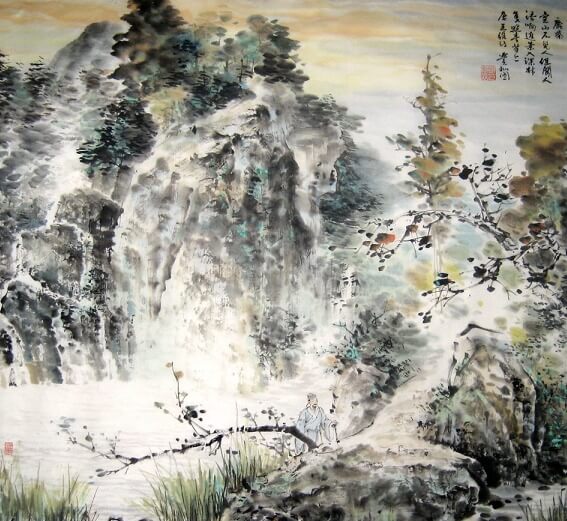Deer-park Hermitage
- Poetry of Wang Wei

There seems to be no one on the empty mountain....
And yet I think I hear a voice,
Where sunlight, entering a grove,
Shines back to me from the green moss.
Five-character-quatrain
Wang Wei, a wealthy Chinese government official during the Tang Dynasty, was also a devout Buddhist, and is often referred to as 诗佛 (Poetry Buddha). The poem ‘Lu zhai’, taken from a series of twenty poems inspired by various sites along the Wang River in northeastern China, is now one of the most widely translated poems from the Chinese classical tradition. Most believe that the title alludes to the Deer Park in Sarnath, the site of the famous Bodhi Tree beneath which the Gautama Buddha preached his first sermon. It is also an ancient name for a deer enclosure that was close to Wang Wei’s house in the countryside.
The poet expresses his feeling of peace when examining the nature surrounding him. His description of the setting in the first two lines reveals the extent to which he is immersed in his surroundings: human society is reduced to a mere “echo,” as if he is in a world by himself. This feeling of peace is underscored by his title as the “Poetry Buddha,” as most Buddhists strive to become one with nature.
The use of senses is vital in bringing alive the piece of work. Wang first draws on his sense of vision, stating that he is unable to “see” anyone on this mountain. He then goes on to describe his hearing, explaining that he can “hear” faraway echoes. The last two lines once again draws upon his sight, but in a more poetic, detailed manner; he not only juxtaposes light and dark — 景 (rays of sunlight) and 深林 (deep forest) — to highlight how polarity renders nature even more beautiful, but he also notices how light can bring to light often-neglected aspects, similar to the way in which the sunlight allows observers like him to notice the green moss hidden in the depths of the forest. Thus, sensory imagery reveals Wang’s desire to seek refuge in the mountains, a place of peaceful seclusion.
空山不见人,但闻人语响。
返景入深林,复照青苔上。
- Why Chinese poems is so special?
- The most distinctive features of Chinese poetry are: concision- many poems are only four lines, and few are much longer than eight; ambiguity- number, tense and parts of speech are often undetermined, creating particularly rich interpretative possibilities; and structure- most poems follow quite strict formal patterns which have beauty in themselves as well as highlighting meaningful contrasts.
- How to read a Chinese poem?
- Like an English poem, but more so. Everything is there for a reason, so try to find that reason. Think about all the possible connotations, and be aware of the different possibilities of number and tense. Look for contrasts: within lines, between the lines of each couplet and between successive couplets. Above all, don't worry about what the poet meant- find your meaning.
- Seven Poems on Kaiyuan Era: Dancing Horses
- Midnight Song of the Four Seasons: Summer
- In Reply to Pimei’s Poem Written During Illness
- Ten Odes on Tea Utensils: Tea Vale White Lotus
- Spring Thoughts II
- The Arcane Celadon of Yue Kiln
- Lodging by Riverside Tower
- Along the River for Flowers Alone I
- The Cottage by the Stream
- The Lotus-Gathering Song